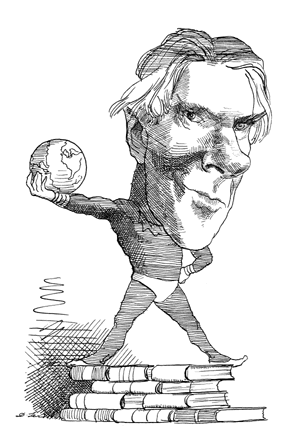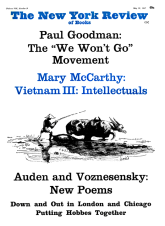Life is short, and Anthony Powell’s “Music of Time” sequence is long: eight volumes down, apparently at least four to go. Is it worth all the trouble? Tastes differ, and some magisterial votes have been cast against Powell. According to Edmund Wilson, he is “just entertaining enough to read in bed late at night in summer, when [through some freak of the US mail?] his books usually reach me.” Many of us, however, would be ready to pipe up for him even on a grey winter’s dawn. He has wit, style, and panache, in a world where those qualities are in permanently short supply, although imitations abound; his ear for give-away dialogue is dauntingly exact; and he has created a whole zooful of memorable characters (still, when the theoreticians have done their worst, the novelist’s primary skill). Admittedly it is possible to feel that he overreached himself setting up quite such elaborate scaffolding for “The Music of Time,” and certainly his (or his narrator’s) general reflections on life and its vicissitudes tend to be rather lame. A Marcel Proust he’s not. Nevertheless, I think the novels gain by being read cumulatively rather than piecemeal. To watch careers diverge or intersect, to spy out improbable affinities, to trace the unexpected new groupings which form after each shake of the social kaleidoscope—these are quintessential Powelline pleasures, and they need space. They also call for an adroit technique, and he is a master of foreshortening and narrative tempo. His devices can turn into mannerisms: he has a perverse habit of stretching out his thinnest material like chewing gum, to see how far it will go, while his mock-mandarin running commentary is not without a taint of fussiness. But the general effect is one of economy and finesse.
For most of Powell’s admirers perhaps the ultimate proof of his excellence as a novelist is that without resorting to violent satirical distortion he should be able to get so much comic mileage out of such unappetizing specimens, that he should be able to make their fate so engrossing. In the prewar sections of his sequence, apart from occasional forays into Bohemia, he deals mainly with English country house society at its most vapid and classbound. Wittgenstein used to say that whenever he got back to Cambridge the first thing that made him want to turn and run was the sound of a well-bred undergraduate voice saying “oh, really?”, and there is a good deal of “oh, really?” about Powell’s characters. They are mostly foppish, lack-adaisical, unforthcoming members of an aristocracy which is losing its grip; a few of them even seem a bit soft in the head. Yet in Powell’s hands they are something more than farcical zombies. A melancholy shading gives the picture depth.
WITH THE COMING of war the social range of the sequence naturally widens. The Valley of Bones, which appeared a couple of years ago, was a wan, at times very funny, account of phony-war tedium, of a military life with less grandeur than servitude, and more aimless hanging-about than either. The latest installment, The Soldier’s Art, covers the period from the fall of Paris to the German invasion of Russia. It consists of three sections: two episodes from the narrator’s, Nicholas Jenkins’s, life as a second lieutenant at staff headquarters somewhere in Northern Ireland, with a long description of him on leave in London sandwiched in between. The army scenes are less successful than those in The Valley of Bones. They are mainly taken up with regimental intrigue and the power struggles of the officers’ mess. The politics seem authentic enough, but with one or two exceptions—notably the relentlessly boorish Captain Biggs—the bit-players have less substance than usual. The London chapter, on the other hand, shows Powell back very near top form. Jenkins, interviewed for the post of liaison officer with the Free French, fluffs the translation test. Later, in the evening, he consoles himself drinking and dining with friends. New bedroom alliances come to light, old characters reappear. Audrey Maclintick is just as much of a shrew as ever. (A really scary portrait, this.) At the Café Madrid, Max Pilgrim is enjoying a revival in cabaret with his 1920-ish ditties: “Tess of Le Touquet,” “Heather, Heather, she’s under the weather.” On Regent Street, in the pitch dark of the blackout, the whores flicker their electric torches. The whole episode is amusingly and convincingly done, but the serious-minded may feel tempted to ask a classic question of the period: “Don’t you know there’s a war on?” And Powell promptly answers them, twice over. Within a short space of time on the same night two groups of Nicholas Jenkins’s friends (I won’t reveal who) are killed in separate air-raids.
Advertisement
One of the fatal bombs falls on the Madrid, which is plainly meant to stand for an actual night club, the Café de Paris, which received a direct hit during the war. The incident was particularly horrible and macabre (see Constantine FitzGibbon’s account in his book, The Blitz), and Powell could easily have treated it as a grotesque set piece, but he is content to report it briefly through an intermediary. Nor does he devote much more space to the second bomb, which hits the back of a private house. (The facade, perhaps symbolically, is left intact.) In both cases we brush against tragedy and hurry on. Nicholas Jenkins’s chagrin at failing to translate a piece of official gobbledygook into idiomatic French is more sharply realized than his response to sudden catastrophe. If Powell were Tolstoy he would doubtless be able to mix compassion and irony in exactly the requisite proportions, but within his own limits he seems to me a tolerably honest reporter. Our own minor setbacks rankle while, mostly, other people’s disasters leave us unscarred. And war in particular jumbles up feelings, heightening the discrepancy between ultimate purpose and (except for those actually caught in the line of fire) immediate dingy circumstance. Arguably, Jenkins, the son of a professional soldier, gets more of a romantic kick out of the trappings of army life, the ribbons and red tabs, than he ever quite admits to. The over-all effect of The Soldier’s Art, however, is of incongruity, of a charade which at any moment is liable to start being played in deadly earnest.
Bumbling through the military scenes in the novel is the ever-resolute Widmerpool, now a staff major but angling for higher things. We are doled out a few gems of Widmerpudleian pomposity, and shown him behaving so odiously to his subordinates that his discomfiture when it comes is more welcome than ever. Impossible to believe, though, that by the next volume he won’t be forging ahead again. A triumph of characterization, he is the one figure in “The Music of Time” whom the author can’t stop punishing—and he keeps bouncing back for more. His great sin—perhaps the greatest in the Powell world—is that he believes so nakedly, so unashamedly, in making good. Of course, class assumptions are strongly at work here; most of the sympathetic characters are supposed to be displaced top people in a period when power is slipping into rougher hands, but top people nonetheless. Basically Widmerpool is a traditional toryish caricature of an upstart, a new man. Idea for a New Statesman competition: describe him as he would appear in a novel by C. P. Snow. Alternatively, describe Lewis Eliot as he would appear in a novel by Anthony Powell “The Music of Time,” it must be conceded, is hardly a masterpiece of comprehensive social realism, but on its own terms—those of a sardonic, intelligent man of the world—it is admirable. It belongs, I’d say, on the same shelf as Saki or Harold Nicolson’s Some People—and there are worse shelves than that.
A MEETING BY THE RIVER is the first Isherwood novel in which the author’s Vedantic allegiances play anything like a central role. The river is the Ganges, the meeting takes place between two English-born brothers, the ascetic Oliver and the worldly-wise Patrick. After giving up a business career for social work with the Quakers and the Red Cross, Oliver has moved on to Hinduism. (He has fallen under the spell of a Swami, who before his death has marked him out as a disciple.) For a long time he hesitates to break the news to his family; then, out of the blue, he writes to his brother announcing that he has entered a Hindu monastery and is shortly to take sannyas, his final vows. Patrick, a successful publisher currently tying up a deal in Hollywood, hurries out to India hoping to dissuade him—although that is putting the situation much too simply. As their letters and journals reveal, the brothers’ feelings about each other are tense and ambivalent; while off-stage complications loom. Oliver is still a little bit in love with Patrick’s wife; there is, as always, Mother to be thought of; Tommy, a good-looking young ganymede whom the versatile Patrick has discovered and bedded down with in Los Angeles, starts making embarrassing long-distance calls. Old grudges stir, temptation alternates with rebuff. Patrick is insenstive but not unsubtle; Oliver half despises him, half needs his approval. In one corner of his mind, he even wants to be seduced. Eventually, reconciled, they go their separate ways. Oliver takes his vows; Patrick disembarrasses himself of Tommy and flies back to London. He is still in bondage to Maya, the illusory world of the senses, but Oliver is convinced that under the influence of the Swami (or, rather, of the Swami’s spirit) he will ultimately work out his salvation.
Advertisement
An unsympathetic commentator—e.g., Patrick, most of the time—might well conclude that essentially Oliver is a son in search of an ideal father, casting the Swami for the role in which earlier mentors (more liable to disappoint, because still alive) have failed. He himself acknowledges that in his worst moments what sustains him is less a belief in God as such than a belief in the authenticity of the Swami’s claim to have known God; and it is an ecstatic vision of the Swami which finally enables him to take his vows wholeheartedly. His transference, so to speak, is complete. Again, what he sees as renunciation another man might well describe as masochism; Patrick scores a point when he compares him to Lawrence of Arabia in his determination to outgo even the demands of the monastic order with his self-imposed hardships. Not that his struggle to curb his pride, to show his ego “its unchanged unregenerate vicious monkey-face” isn’t moving and impressive; I’m not suggesting that it can simply be psychologized away. Patrick, grabbing at the best of both world, is the lesser man of the two. What is true, however, is that the psychological patterns of the story are worked out more energetically than the spiritual design. As a study in complementary and conflicting temperaments, in sibling rivalries, even (although Patrick, the elder brother, also has to deputize for the imperfect real father), it has its undoubted point. The brothers’ characters intermesh neatly, the mild humor ripples amiably along, the writing, as you’d expect, is crisp and concise. But at the heart of the book there is a blur: the underlying religious assumptions are insufficiently dramatized—or so I felt—and have to be taken too much on trust. Possibly there is more to it all than meets the glazed secular eye, but I must admit that I found myself sighing impenitently for the brilliant camerawork of the old days when Mr. Issyvoo was still completely bound to Maya—or, to give it its more familiar name, the real world.
This Issue
May 18, 1967




